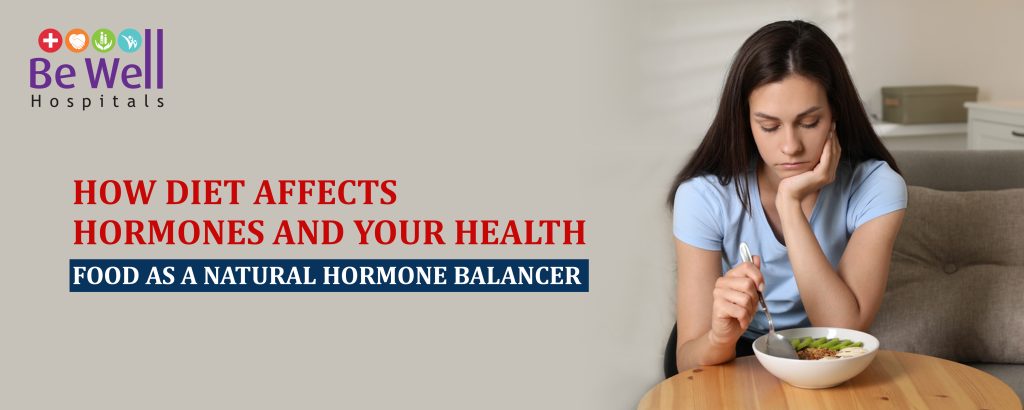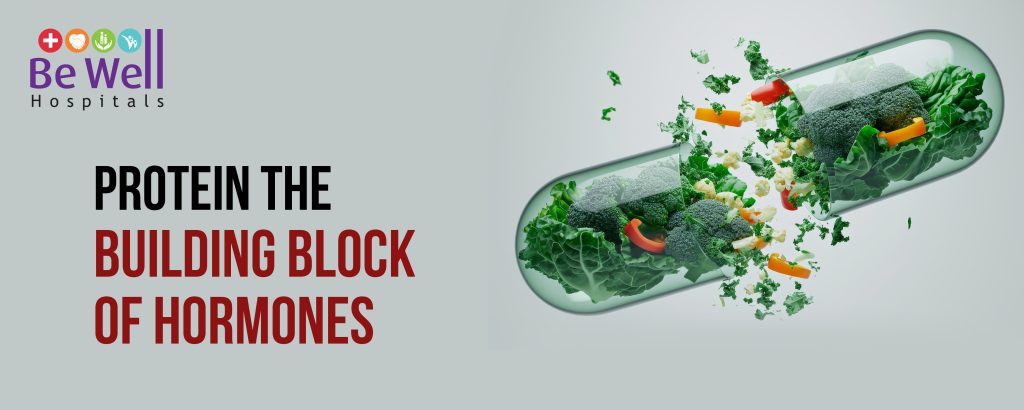Introduction
Hormones are the body’s chemical messengers, controlling everything from mood and metabolism to sleep cycles, fertility, and energy levels. But did you know that what’s on your plate can directly influence your hormone balance? A nutrient-rich diet supports your endocrine system, while processed, sugary, or chemically-laden foods can lead to serious imbalances. Whether you’re feeling fatigued, noticing skin changes, struggling with weight, or experiencing mood swings, your food choices may be the hidden culprit. In this blog, we explore how your diet affects hormonal health—and how smart nutrition choices can help restore balance and vitality naturally.

Gut Health: The Foundation of Hormone Balance
A healthy digestive system isn’t just for nutrient absorption—it’s key to hormonal harmony. Your gut houses trillions of bacteria (the microbiome), which help regulate hormones like estrogen, cortisol, and insulin. Certain microbes—like the estrobolome—specifically process and regulate estrogen levels. When the gut is imbalanced (a state called dysbiosis), it can lead to estrogen dominance, PMS, irregular periods, mood swings, and even higher risk of hormone-sensitive cancers.
Chronic gut inflammation can also increase cortisol production, the body’s primary stress hormone, creating a ripple effect that disturbs other hormonal pathways. To support gut health, prioritize fiber-rich vegetables, fermented foods like yogurt or kimchi, and prebiotic foods such as garlic, bananas, and oats. Avoiding excessive antibiotics, processed foods, and refined sugar helps preserve microbial diversity—ensuring your gut supports, rather than sabotages, hormonal balance.
Key Nutrients That Power Hormone Production
Hormones are built from nutrients—especially healthy fats, vitamins, and minerals. For example, cholesterol is the building block of estrogen, progesterone, and testosterone, making healthy fats essential for hormone synthesis.
- Healthy fats: Avocados, nuts, seeds (flax, chia), olive oil, fatty fish, ghee
- Vitamin D: Found in sunlight, egg yolks, cod liver oil, and fatty fish, supports reproductive health and mood regulation
- B vitamins: Found in whole grains, leafy greens, legumes, and eggs, help regulate stress and energy hormones
- Magnesium: Present in pumpkin seeds, spinach, and dark chocolate, reduces cortisol and supports thyroid hormones
- Zinc: Found in oysters, lentils, and chickpeas, is vital for reproductive and immune hormone balance
A nutrient-dense, whole-foods diet is the best way to provide your body with the raw materials it needs to keep hormones in check.
Blood Sugar Balance and the Insulin Connection
One of the most overlooked elements of hormonal health is blood sugar control. When we eat too many refined carbs, sugary snacks, or skip meals, our blood sugar spikes and crashes. This places stress on the pancreas to release insulin, and over time, may lead to insulin resistance—a root cause of conditions like PCOS and type 2 diabetes.
Unstable blood sugar also triggers cortisol spikes, which interfere with reproductive and thyroid hormones. To maintain stability, build meals around fiber, protein, and healthy fats. Avoid high-glycemic snacks and space meals evenly to avoid energy dips and hormonal disruption.
Avoiding Endocrine Disruptors in Your Diet
Many processed and packaged foods contain artificial additives, preservatives, and plastic-based chemicals that act as endocrine disruptors—compounds that interfere with the body’s hormonal system.Common culprits include:
- BHA/BHT: Found in snacks and cereals; mimic hormones and affect thyroid function
- Monosodium glutamate (MSG): Triggers excessive cortisol production
- BPA and phthalates: Found in plastic containers and linings; leach into food and disrupt estrogen/testosterone levels
- Pesticides (xenoestrogens): Residues on non-organic fruits/vegetables mimic estrogen and can increase hormonal imbalances
- Reducing your exposure is simple: choose fresh, organic produce when possible, avoid heating food in plastic, and read ingredient labels closely.
Anti-Inflammatory Diet = Hormonal Harmony
Chronic inflammation affects the adrenal, thyroid, and reproductive glands. An anti-inflammatory diet calms these systems and restores equilibrium.
Include:
- Leafy greens (spinach, kale)
- Berries (blueberries, strawberries)
- Fatty fish (salmon, sardines)
- Turmeric and ginger
- Olive oil
- Nuts and seeds
Avoid:
- Refined sugars
- Trans fats
- Excessive red meat
- Artificial additives
This dietary pattern not only supports hormone health but also reduces fatigue, irritability, and menstrual discomfort.
Protein: The Building Block of Hormones

Protein helps your body build and regulate hormones like growth hormone, leptin, and ghrelin (which manage metabolism and appetite). Eating protein keeps you full, stabilizes blood sugar, and supports muscle repair—all vital for hormonal health. Sources include:
- Animal-based: Eggs, chicken, fish, Greek yogurt
- Plant-based: Lentils, tofu, quinoa, nuts, seeds
Include protein at every meal to support energy, mood, and metabolic balance.
The Right Fats for the Right Hormones
Low-fat diets may sabotage your endocrine system. Hormones like estrogen and progesterone need fat for their production. Healthy fats support your brain, ovaries, and thyroid.
Best fat sources:
- Avocados
- Nuts (almonds, walnuts)
- Seeds (chia, flax)
- Extra virgin olive oil
Avoid trans fats, hydrogenated oils, and fried foods, which are inflammatory and hormone-disruptive.
Dietary Patterns That Promote Hormonal Balance
Rather than restrictive diets, aim for sustainable, whole-food-based eating styles:
- Mediterranean diet: High in fiber, fish, olive oil, and veggies—great for PCOS and heart health
- Thyroid-friendly diet: Rich in iodine (seaweed), selenium (Brazil nuts), and zinc (seeds, shellfish)
- Plant-forward diets: Help eliminate excess estrogen through fiber and improve insulin sensitivity
Tailor your diet based on your needs and any hormonal conditions you may have.
Hydration and Hormone Circulation
Hormones travel through the bloodstream—and blood is mostly water. Inadequate hydration stresses the body and raises cortisol, which affects all other hormones. Dehydration also impacts nutrient absorption and kidney function, compounding imbalances.
Aim for at least 6–8 glasses of water a day, and include water-rich fruits like cucumbers, oranges, and watermelon. Cut back on caffeine and alcohol, which dehydrate the body.
The Daily Balancing Act
Your hormones don’t need perfection—they need consistency. Supporting them through a mindful diet, regular hydration, and reduced exposure to disruptors lays a strong foundation for overall health. Remember: food is medicine. Making small, intentional choices each day—choosing leafy greens over chips, or water over soda—can have a massive impact on your mood, sleep, weight, and vitality.
Conclusion
Hormonal imbalances don’t happen overnight—but they can often be corrected through daily, nourishing choices. From healing your gut to supporting your thyroid, the food you eat directly influences how well your hormones function. A balanced diet rich in protein, fiber, healthy fats, and key nutrients can transform how you feel—energized, emotionally stable, and in tune with your body.
If you’re experiencing symptoms like fatigue, irregular cycles, stubborn weight, or low mood, it may be time to look at your plate. At Be Well Hospitals, our experts in Endocrinology and Nutrition can guide you toward a hormone-friendly lifestyle that’s right for you. Take the first step toward hormonal balance—schedule your consultation today by calling 9698 300 300 or visit your nearest Be Well Hospitals. Your body will thank you.
